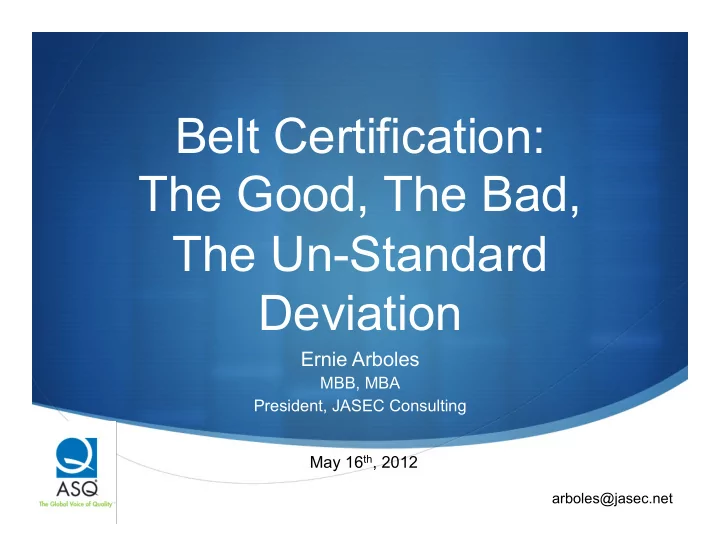

Belt Certification: The Good, The Bad, The Un-Standard Deviation Ernie Arboles MBB, MBA President, JASEC Consulting May 16 th , 2012 arboles@jasec.net
Belt Certification: The Good, The Bad, The Un-Standard Deviation ABSTRACT: Lean and Six Sigma capability are no longer just § a competitive advantage for companies, they are now a do or die necessity to staying in the game. At the same time, it seems like anyone with internet access can get a belt online. What about you? Is certification worth the effort and money? What will it mean on the job? What will it mean for your career trajectory? What should you look for in a training program? Hear from a 16-year veteran of quality, consulting, and big company operations. Plus, get some tips on how to insure your success on the job.
Overview § Is certification worth the effort and money? § What should you look for in a training program? § What will it mean on the job? § What will it mean for your career trajectory? § Some “variable” suggestions for your career f(x)
Is it Worth the Effort and Money? § U.S.-based Six Sigma Master Black Belts earn an average annual salary of $122,627. Source: 8th Annual iSixSigma Global Salary Survey § U.S.-based quality professionals who complete any Six Sigma training earn $12,642 more than those without it. Source: 2011 QP Salary Survey
Is it Worth the Effort and Money? Figure 1: Black Belt Worldwide Average Salary Year to Year Black Belts After several years of relatively flat numbers, the average worldwide BB salary rose to $83,107, up 5 percent from the previous year (Figure 1 ). Since the 2004 report, the overall trend has been upward, with BBs experiencing an average increase of 19 percent. Source: 9 th Annual iSixSigma Salary Survey
Is it Worth the Effort and Money? Figure 2: Master Black Belt Worldwide Average Salary Year to Year Master Black Belts MBBs are likewise at a peak salary from the first salary survey report in 2004; MBBs have seen a steady increase in their average salary over that time (Figure 2). The average annual salary of MBBs worldwide is now $117,009. Source: 9 th Annual iSixSigma Salary Survey
Certification and Roles Not surprisingly, the overwhelming majority of BBs and MBBs have certifications corresponding to their roles; 93 percent of BBs hold BB certification and 79 percent of MBBs hold MBB certification. The majority of DLs reported that they are certified as MBBs (60 percent) or BBs (36 percent) (Figure 3 ). Certifications remain a strong component for the roles of QE and QP: 97 percent of QEs reported some level of Belt certification, as did 84 percent of QPs (Figures 4 and 5). Close to half of BPs stated that they are certified as BBs (46 percent), with 24 percent certified as MBBs and 13 percent certified as GBs. (Figure 6) Figure 4: Quality Executives by Highest Level of Certification Figure 3: Deployment Leaders by Highest Level of Certification Figure 5: Quality Professionals by Highest Level of Certification Figure 6: Business Professionals by Highest Level of Certification Source: 9 th Annual iSixSigma Salary Survey
The Training Landscape
Some Pre-Training Questions (Some Pre-Belting Questions) § Can you do it on the job? § Does your employer have a program? § Does your employer value Six Sigma or Lean? (Culture?) § How far are they willing to go to make it happen? § How far are you willing to go to make it happen?
What to Look for in a Training Program? § Results, Results, Results § You get what you pay for § Mileage § Theoretical vs Practical § A Name? § Results, Results, Results – Get references
What Will Certification Mean on the Job? § More Money § More Special Projects (Higher Visibility) § Accelerated Promotion Track § Competition
What Will Certification Mean for Your Career Trajectory? § More Money § More Special Projects (Higher Visibility) § Accelerated Career Track § Competition
What is the ROI? § Training Costs § Value of Your Time Costs § Long-Term gain Training + Time = Long-Term Gain
Some “variable” suggestions for your career f(x) § You § Leadership § Career Arcs § Final Word
You § Invest in Others – It’s about relationships § Listen § Invest In Yourself § Education § Reading § Travel § New Challenges & Opportunities
Leadership § What Is It? § How Do You Earn It? § Initiative § Stars vs Black Holes
Career Arcs
Final Word § Always Do The Right Thing 10 Sigma Your Long-Term Performance
Role Definitions Black Belt: Full-time professional who leads Six Sigma projects. Typically has four to five weeks of classroom training in S methods, statistical tools and team skills. Sometimes provides coaching and Six Sigma expertise to Green Belts. Master Black Belt: An expert in Six Sigma methodology and statistical tools who provides strategic Six Sigma guidance S within a specific function or business unit. An MBB often has prior experience as a BB. Responsible for coaching, mentoring and/or training BBs, an MBB often helps the Six Sigma Deployment Leader and Champions keep the initiative on track. Champion: Middle- or senior-level executive who sponsors a specific Six Sigma project or effort, ensuring that resources are S available and cross-functional issues are resolved. Deployment Leader: Senior-level executive responsible for implementing Six Sigma enterprise wide. Typically reports to S higher C-level executives. Responsible for developing, implementing and maintaining a standardized, company-wide quality system focused on customer satisfaction, defect prevention and continuous improvement. Quality Professional and Quality Executive: While not universally regarded as Six Sigma roles, QPs and QEs may have Six S Sigma responsibilities and qualifications. Business Professional: Although they may not be in Six Sigma roles currently, the majority of these professionals possess Six S Sigma certification and may have project experience. This is the second year BPs are included in iSixSigma’s Global Salary Survey. Source: 9 th Annual iSixSigma Salary Survey
Recommend
More recommend